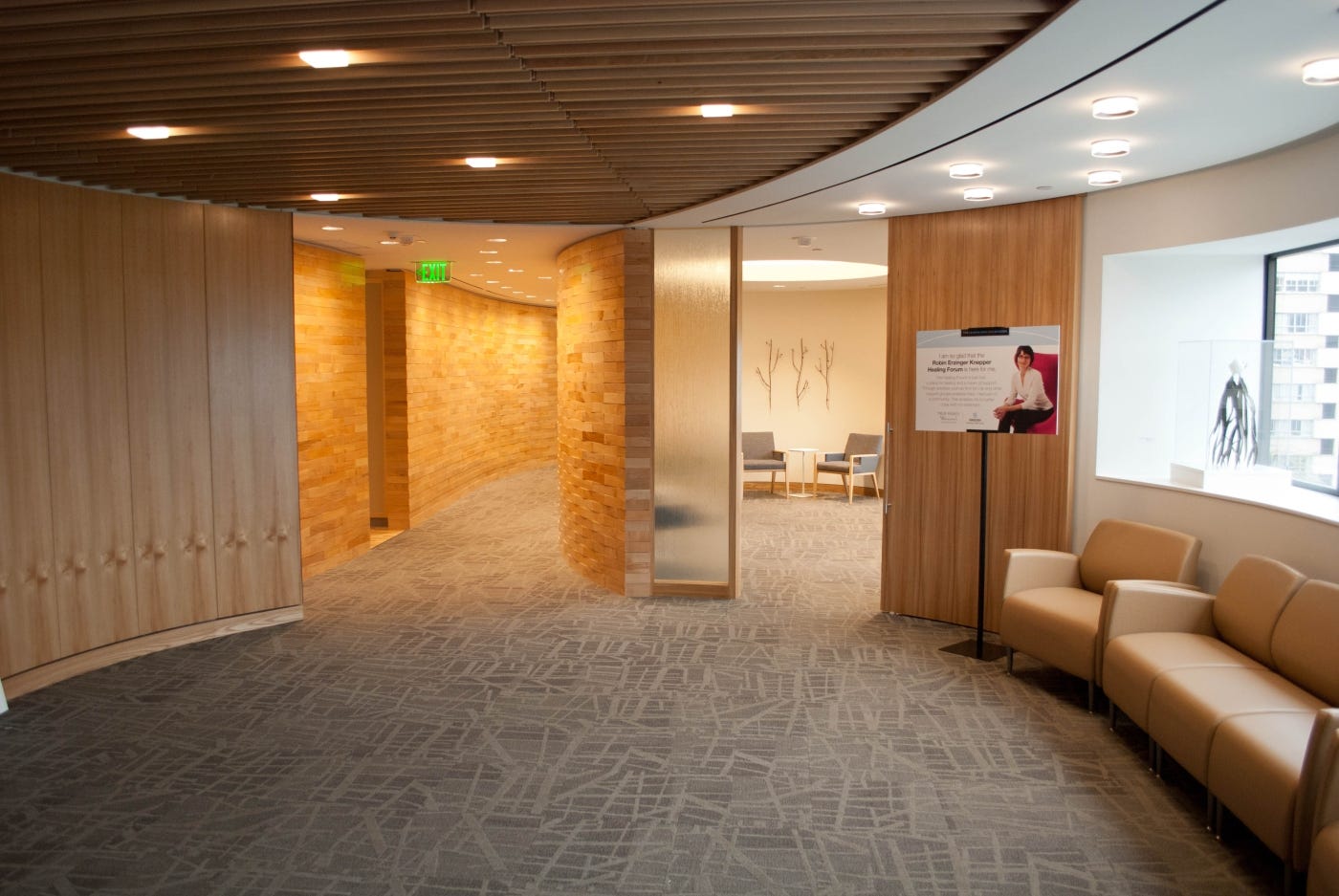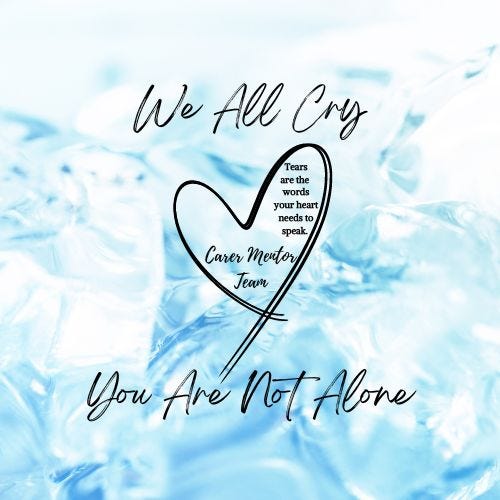Sweet Relief
After He Said Cancer | A Memoir
‘Caring about Crying. We All Cry. You’re Not Alone.’
Day 13 of the Collaboration offers a personal essay about happy tears. This publication is part of a month-long collaboration that was the brainchild of Victoria Chin, the Carer Mentor. Thank you, Victoria, and the other 12 great writers participating in this month-long challenge. Tomorrow, I pass the baton to Victoria (@carermentor) to carry on the anthology.
***********************************************************************************************************
The curved walls and ceiling were paneled in wood, a stark contrast to one’s expectations for a cold, white hospital waiting room. The warm and rich colors in yellow and brown wrapped around me, and I felt safe.
Today would be the third opinion from a breast cancer specialist, who had been highly recommended by a nurse that enrolled patients into breast cancer clinical trials. This new cancer doctor was aggressive in fighting cancer and wouldn’t sugar coat the clinical picture. It was music to my ears.
I had tried to get an appointment with her in the very beginning, but her schedule was full. Between my calls and those of my husband, something fell into place, and we had an appointment. I was grateful.
My husband was seated in the waiting room reading a magazine. Whether or not he saw a new cancer specialist wasn’t as important to him as it was to me. I wasn’t satisfied with his current care. I wanted more from his oncologist.
I found my way to a small alcove with a sign, “Patient Library”. To have a small library dedicated to breast cancer felt like an immediate step up from the last clinic. There were examples of breast prostheses, bras to use after mastectomy, an example of the drains used after surgery, books on the mastectomy experience, a binder of patient information, and flyers for classes and workshops. Heaven!
The title of one flyer caught my eye, “Crafting a Survivorship Plan for the Mind, Body, and Spirit.” It was a guided workshop to offer space for how to explore what has changed because of the cancer diagnosis and how to move through uncertainty after illness with more patience, self-compassion, and possibility.
Wasn’t that what I had needed through this entire journey? A way forward with a guide. Someone to help me make sense of what I was losing through my husband’s cancer diagnosis and how life would change. Sign me up, I thought, and my hope ticked up a notch.
I heard my husband’s name called and I reluctantly left the library. As I was walking to the room, it struck me how quiet it was here. There was less hustle and bustle in the hallways. The place felt more peaceful somehow, and this helped calm me.
“Yes, we were here for a second opinion,” my husband said. While he and the medical assistant were talking, my eyes began wandering around the room. I wanted to be a ‘fly on the wall’. I was tired of fighting for better care and worrying about the lax follow-up schedule proposed by his cancer doctor. I was fatigued, hopeful, and afraid of what the new doctor might say. If I could have crept into a cocoon and watched the visit on a small screen, I would have.
Minutes ticked by and I tried not to think. Thinking doesn’t help sometimes. It makes things worse, especially if the word ‘cancer’ is part of a family’s vocabulary. It is better to react to the paint color on the walls, the choice of pictures on the wall, and the way the room smells and feels. Just exist in the moment, I reminded myself.
The door opened and she walked in – petite, well dressed, and with a serious demeanor. No makeup. She introduced herself to both my husband and me, shaking both of our hands, and looking us both in the eyes. I felt included.
“As the odds of my survival are a coin flip, I want to be with someone connected to clinical trials to give myself the best possible chance,” my husband said. It surprised me to hear him articulate so clearly the reason for our visit. I had assumed it was more my initiative.
“Let me begin by reviewing what we know about your case,” she said. My husband’s cancer was rated as grade 2 by the pathologist. A grade 3 tumor would be more sensitive to chemotherapy. An index of how quickly his cancer cells were dividing was in the middle of the range, so a moderately growing tumor. He had extensive invasion of the lymph and blood vessels.
She went on. His PET-CT scan had shown a small area of uptake in his liver, which would have prompted her to do a liver MRI scan. He also had a few small areas in his adrenal gland.
“These findings were never mentioned to us. Does this mean that he could have had a stage 4 cancer from the very beginning?” I asked. My heart was suddenly stuck in my throat.
They had watched a few spots in his ribs, but no one had disclosed these small spots on the liver and whether they were tracking them or not.
“I am concerned that he is at high risk for a recurrence,” she said with her serious demeanor, looking us both in the eyes.
She hadn’t answered my question. But a wave of relief came over me, anyway. She said the words that I had felt since the beginning. My husband needed an aggressive approach to treating his cancer and checking for a recurrence. I had planned on living with this man for another 30 years. And our girls were still very young.
Silent tears began streaming down my face. I was trying so hard to get through this appointment without emotion but was failing. To have someone say the words that captured my fears for his survival were overwhelming.
“His clinical picture made me think of the DARE Clinic Trial1, which enrolls high-risk patients and uses a blood test to check for fragments of tumor DNA circulating in his blood. Once these fragments are detected in his blood, it is about 6 months before the cancer becomes stage 4. This result helps us to act early and start more aggressive treatments,” she said.
More tears, as I silently nodded my head. I had known that they were using new blood tests that detected circulating tumor DNA to check for cancer recurrence in patients they thought were in remission. This had become standard of care in colon cancer but was still in clinical trials for breast cancer. In a few years, this was likely to become standard of care for breast cancer. But I wanted my husband to benefit from this technology right now.
“Unfortunately, he doesn’t qualify for the DARE study because he only stopped taking Verzenio one month ago. He wouldn’t qualify to enroll in this clinical trial until he has been off Verzenio for one year,” she said.
The tears stopped flowing for a moment as I realized that he wouldn’t qualify for this clinical trial. Verzenio was a new medication that reduced the risk of recurrence in high-risk breast cancer patients. It had been recommended that he take Verzenio for two years. He took the last pill only three weeks ago. My heart fell.
“So, over lunch I called the company that is sponsoring the test for this clinical trial,” she said. “I am concerned that breast cancer in high-risk patients will start coming back very quickly after stopping Verzenio. I wanted the company to pay for your testing as a pilot study. They agreed and we will be able to draw the first blood test for the tumor DNA fragments today.”
The tears began flowing again, but this time they were propelled by hope. This new cancer doctor had called a company over her lunch hour to ask them to pay for specialized blood tests checking for the spread of my husband’s cancer – before she had even met him.
I was sobbing now. The weight of the last two years was falling away and all I felt was sweet relief.
Footnote
1 My husband did not qualify for the DARE clinical trial as he had only recently stopped taking Verzenio, a CD4/6 cell cycle inhibitor. His doctor enrolled him outside of the trial. https://www.clinicaltrials.gov/study/NCT04567420
******************************************************************************************************
Care to Share?
An article, a Substack note, a poem, art, a great quote or music?
A personal experience with tears or crying.
Here’s how:
Create a piece about your tears or crying
REFERENCE The Carer Mentor Collaboration ‘Caring About Crying’ OR Simply draw a Heart with ‘I CARE’ inside it.
SHARE the URL Link in the comments below with the TITLE in CAPS
FIND and READ someone else’s piece, comment and restack.
A few catalyst thoughts: When did you last cry? Tell us about your most profound experiences of crying. Do tears come easily? When someone cries, what do you do—how do you receive tears?
The Caring About Crying Anthology. We All Cry. You’re Not Alone.
Sept 1 Launch article: Caring About Crying. We All Cry. You’re Not Alone By Victoria at Carer Mentor: Empathy and Inspiration
Sept 2 Crying: 'Did you know?' Resource: Tears the science and some art. By Victoria at Carer Mentor: Empathy and Inspiration
Sept 3 'Cry, Baby. Why Our Tears Matter' A Podcast Interview. Dan Harris and Dr Bianca Harris of Ten Percent Happier with Reverend Benjamin Perry. By Victoria at Carer Mentor: Empathy and Inspiration
Sept 4 ‘In Conversation with Rev. Benjamin Perry’. Victoria interviews the Author of 'Cry Baby: Why Our Tears Matter' By Victoria at Carer Mentor: Empathy and Inspiration
Sept 5 ‘My stoic mom's parting gift: Making peace with tears’ By Sarah Coomber at Sandwich Season
Sept 6 We Invite You to 'Care About Crying'. By Victoria on behalf of the team.
Sept 6 ‘ICU Special Edition: There's Crying in Baseball?’ By Nurse Kristin at HCT:Heal Cure Treat
Sept 7 Triggered. Caring About Crying Anthology By Kristina Adams Waldorf, MD at After He Said Cancer and Anne at The Future Widow
Sept 8 'Can't Cry. Want to Cry??' A Caregiver's Paradox of Human-ing. By Victoria at Carer Mentor: Empathy and Inspiration
Sep 9 ‘AWC Town Bulletin - On Crying’ By Tiffany Chu and Bakhtawar at Asian Writers Collective
Sep 10 The Healing Power of Tears By Louisa Wah at Lily Pond
Sept 11 My Tears are not a Grief Gauge by Anna De La Cruz at Gen Xandwich
***********************************************************************************************************
Thank you for being one of my readers. I appreciate you very much! If you’d like to support my work you can do so by:
Hearting this post, so that others are encouraged to read it
Leaving a comment (I do my best to respond to each of them), which increases engagement and visibility of my posts
Sharing this post by email or on social media
Taking out a free or paid subscription to this Substack
Leaving me a tip by buying me a coffee.






I think my heart did a little free-fall flip for you. My gosh what a great specialist! Thank you for sharing this with us Kristina! Sending hugs and prayers to you, your husband and the girls. Relief, exhaustion, connection....not so alone, and everything in between tears. xo
Poignant, personal and profound! The lunchtime call by your new oncologist is a huge encouragement to those of us struggling through a life challenge while surrounded by strangers. I had at least two experiences like that during my leukemia adventure: Doctors went the extra mile to make calls or ask for opinions on my case. Learning of these supplied an enormous boost to my outlook.